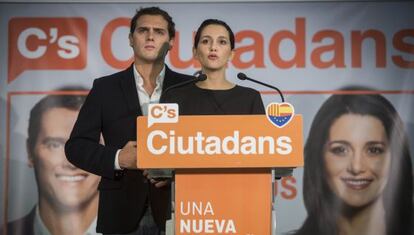Emerging party Ciudadanos plans final attack on two-party system
After success at the Catalan regional elections, leaders are heralding a new era in politics


The strong performance by emerging political force Ciudadanos (Citizens) at the Catalan elections on Sunday has prompted party leaders to raise their own goals ahead of the upcoming Spanish general elections, due to be held in December.
With 25 seats in the regional assembly, up from nine, Ciudadanos has suddenly become the second-largest presence in Catalan politics, after the pro-independence Junts pel Sí bloc headed by current regional premier Artur Mas.
With 25 seats in the regional assembly, Ciudadanos has suddenly become the second-largest presence in Catalan politics
The results confirm what opinion polls have been suggesting for months: that Ciudadanos stands a good chance at breaking the two-party system that has been in place in Spain since the return of democracy in the late 1970s.
By comparison Podemos, the other emerging party threatening the hegemony of the Socialists (PSOE) and the Popular Party (PP), fared much worse at the Catalan elections: 11 seats, and then only as part of a larger leftist alliance called Catalunya Sí que es Pot.
“We can now say that we know how to beat both the two-party system and populism. That’s going to have a pull effect,” says José Manuel Villegas, vice-secretary for Ciudadanos.
Party leader Albert Rivera, who bills himself as Catalan, Spanish and European, now hopes that the mid-November opinion polls will certify that Ciudadanos has surpassed Podemos as Spain’s third political force.
“Our balance between union and regeneration was key, because these are two projects that neither the PP nor the PSOE can defend the way Ciudadanos can,” adds communications secretary Fernando de Páramo.
Founded in 2005 as a Catalan non-nationalist party, Ciudadanos made a jump to national politics last year and secured a presence in most regions at the May elections. In Madrid and Andalusia, Ciudadanos’ support was instrumental in getting premiers invested.
With a mix of progressive liberalism and social democracy, and a message of democratic regeneration, Ciudadanos has allied itself with both the PP and the PSOE at the regional level after forcing would-be premiers to sign a list of anti-corruption measures.
Founded in 2005 as a Catalan non-nationalist party, Ciudadanos made a jump to national politics last year
Until Sunday, the party was aiming for a ceiling of 43 deputies for its congressional debut at the general elections, which Prime Minister Mariano Rajoy has not yet called officially but which are expected to take place in December.
But after the Catalan results, the new ceiling could be upwards of 60 congress members.
“The decadent two-party system is not working toward solving Catalonia’s problems,” says Rivera. “What’s required is a common project for Spain. The PP got the worst results in 30 years and the Catalan Socialists the worst of their entire history in Catalonia.”
“Without a project for Catalonia, you cannot govern Spain,” he adds. “We have the ability to lead this new period.”
English version by Susana Urra.
Tu suscripción se está usando en otro dispositivo
¿Quieres añadir otro usuario a tu suscripción?
Si continúas leyendo en este dispositivo, no se podrá leer en el otro.
FlechaTu suscripción se está usando en otro dispositivo y solo puedes acceder a EL PAÍS desde un dispositivo a la vez.
Si quieres compartir tu cuenta, cambia tu suscripción a la modalidad Premium, así podrás añadir otro usuario. Cada uno accederá con su propia cuenta de email, lo que os permitirá personalizar vuestra experiencia en EL PAÍS.
En el caso de no saber quién está usando tu cuenta, te recomendamos cambiar tu contraseña aquí.
Si decides continuar compartiendo tu cuenta, este mensaje se mostrará en tu dispositivo y en el de la otra persona que está usando tu cuenta de forma indefinida, afectando a tu experiencia de lectura. Puedes consultar aquí los términos y condiciones de la suscripción digital.








































